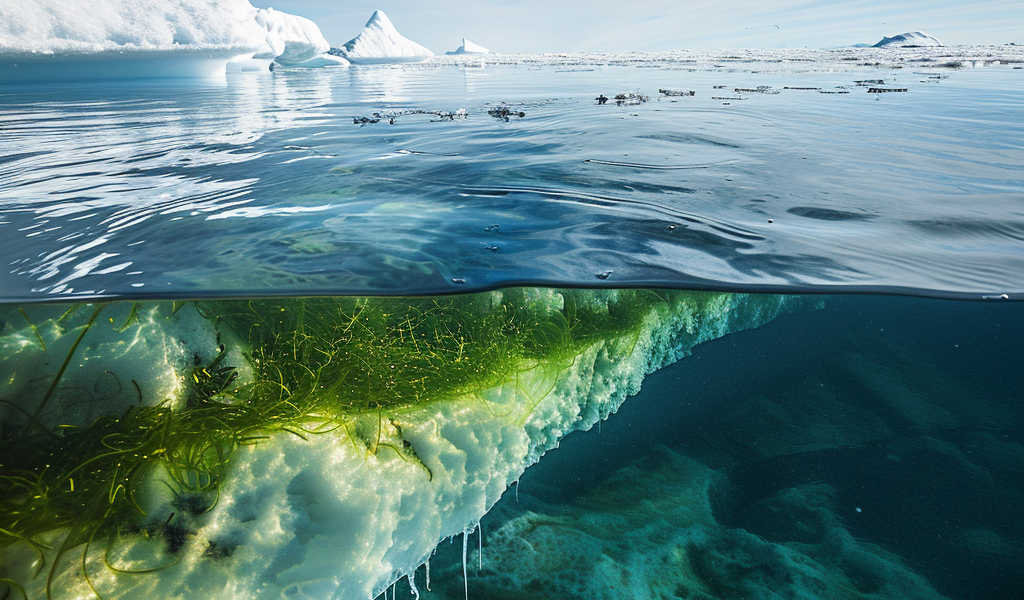Climate Change Threatens Polar Ecosystems: Alarming Decline in Sea Ice Impacts Marine Food Chain
Rapid changes in the polar regions are raising alarm bells among scientists, as the loss of sea ice poses a significant threat to the delicate marine food chain. The ongoing effects of climate change, particularly the dramatic reduction in sea ice and increasing ocean acidification, are altering the growth patterns and nutritional quality of microscopic algae. These algae serve as a crucial food source for a variety of marine species, including fish, krill, and other small organisms that form the foundation of the polar ecosystem.
Sea ice plays a pivotal role in the habitat of microalgae, yet the thickness and extent of this ice have seen alarming declines. Recent data indicates that Antarctic sea ice has been at record low levels for the past four consecutive years. Furthermore, experts predict that by the year 2050, the Arctic Ocean may experience complete ice-free conditions during the summer months, further exacerbating the challenges faced by these ecosystems.
Dr. Rebecca Duncan, a polar marine ecologist, has dedicated the last eight years to conducting field research in the polar regions, focusing on the changing composition of sea ice microalgae. A graduate of the University Technology Sydney (UTS), Dr. Duncan completed her Ph.D. in collaboration with UNIS Svalbard in 2024. Her groundbreaking thesis earned her the prestigious Australian Institute of Nuclear Science and Engineering Thesis Gold Medal, recognizing her significant contributions to the field.
In addition to her research, Dr. Duncan is a strong advocate for increasing the representation of women in scientific fields, particularly in field research. Her efforts have recently earned her the title of “Superstar of STEM” from Science and Technology Australia, highlighting her commitment to promoting diversity in science and encouraging young women to pursue careers in these areas.
Dr. Duncan emphasizes the importance of sea ice ecosystems, stating, “One-tenth of the global oceans are frozen, including the rapidly changing Arctic, Antarctic, and Southern Ocean. These fragile ecosystems depend on microscopic algae as the foundation of their food webs.” The health of these algae is vital, as they provide essential nutrients—such as fats, proteins, and carbohydrates—to a wide range of marine life, from krill and fish to larger predators like polar bears and whales.
However, the nutritional value of these algae is not uniform; it varies significantly based on the species and their responses to the changing environmental conditions. As ocean temperatures rise and ice coverage diminishes, the composition of algae is likely to shift, with potential repercussions for the entire marine food web.
The implications of these changes extend beyond the immediate impacts on marine life. As the foundational organisms of the polar food chain, the health and stability of microalgae populations are crucial for maintaining the balance of the entire ecosystem. The loss of sea ice not only threatens the algae but also disrupts the intricate relationships between various species that rely on them for survival.
In light of these developments, researchers are calling for increased attention to the effects of climate change on polar ecosystems. Understanding the complex interactions between sea ice, microalgae, and marine species is essential for developing effective conservation strategies and mitigating the impacts of environmental changes.
The ongoing research conducted by scientists like Dr. Duncan is vital for shedding light on these issues. By examining the effects of climate change on microalgae and their role in the polar food chain, researchers can better inform policy decisions and conservation efforts aimed at protecting these fragile ecosystems.
As the world grapples with the realities of climate change, the fate of polar ecosystems hangs in the balance. The loss of sea ice and its impact on microscopic algae is a critical area of study that requires urgent attention to ensure the survival of these unique and vital habitats.





